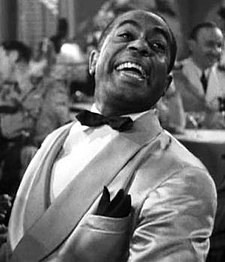Casablanca, starring Humphrey Bogart as Rick, and Ingrid Bergman as Ilsa, is one of those great films many people have viewed again and again because of the intrigue, the romance, the time period in which it's set, the actors in it, etc., etc. Perhaps some people have noticed something different about the movie or have come up with questions about certain characters in it after subsequent viewings. Here's an example of a question that might have surfaced after a viewer had seen the film a few or more times. What about Sam (Dooley Wilson), the piano player, and the songs he sings in the film?
Sam sings not only "As Time Goes By," but he also sings some super standards that have been recorded by a lot of pop and jazz singers since the film was made in 1942. Those standards include songs such as "The Very Thought of You," and "It Had To Be You," which are readily recognizable as Sam plays them. They also include songs that may not be as readily recognized as the ones mentioned above.
By the way, some people might know that another black musician (Elliot Carpenter) was really playing the piano in the film. Carpenter was placed where Wilson could see him and imitate his hand movements. In real life Dooley Wilson was a singer and a drummer. All that aside, let's get back to other songs the character Sam plays inside Rick's Café Americain.
In addition to the timeless numbers, "It Had To Be You" and "The Very Thought of You," Sam plays a few less illustrious numbers like "Knock on Wood" and "Shine." Some fans of the movie and music of the time might consider "Baby Face," which Sam also sings, as a favorite standard.
Of course, as a nice motif during the film, Sam sings reprisals of Rick and Ilsa's theme song, "As Time Goes By" in Rick's Café and upstairs in his private quarters, during flashbacks of Rick's, Sam's, and Ilsa's days in Paris.
Wednesday, July 29, 2015
Saturday, April 4, 2015
Various Spring Love Affairs
When
springtime arrives and settles in, many people's
thoughts turn to romance or perhaps to a love
affair. The love affair could be with a favorite place or with
a person, or it could be with both simultaneously. One’s
thoughts might even turn to an ended affair and how wonderful it was while it
lasted.
As
most people know, a person's love affair with a
favorite city is described in the popular song “April in Paris” (Vernon Duke, composer; E.Y. Harburg, lyricist), which has been performed and recorded by many artists.
 |
An
affair with a beautiful person in a beautiful city is considered in the poem
titled "April in
Paris," included in the poetry books, The Sound of Dreams Remembered and Something about the
Blues. Both books are by African American novelist, essayist,
and poet Al Young (photo at left).
An ended love affair is described in the song “I’ll Remember April,” as its lyricists (Patricia Johnston and Don Raye) convey the beauty of April and the loveliness of the affair experienced during that month. The song, composed by Gene de Paul, also speaks of the contentment and gratefulness the lover feels for having had the affair at all.
Thursday, January 15, 2015
Connecting Falling Snow with Photographer Gordon Parks in Paris
.jpg) About a week ago, when the first snow of 2015 was falling in the DC area, where I live, and I was watching the beauty of it from my window, my thoughts turned briefly to the following facts. In 1950, the great American Photographer Gordon Parks spent nearly two years assigned to Life Magazine's Paris bureau. The falling snow reminded me of that fact, because I'd recently read it in one of the volumes of his autobiography, To Smile in Autumn. One of its chapters reveals how much Parks enjoyed his time in Paris. Lines from that chapter which my area's recent snowfall reminded me of reads as follows.
About a week ago, when the first snow of 2015 was falling in the DC area, where I live, and I was watching the beauty of it from my window, my thoughts turned briefly to the following facts. In 1950, the great American Photographer Gordon Parks spent nearly two years assigned to Life Magazine's Paris bureau. The falling snow reminded me of that fact, because I'd recently read it in one of the volumes of his autobiography, To Smile in Autumn. One of its chapters reveals how much Parks enjoyed his time in Paris. Lines from that chapter which my area's recent snowfall reminded me of reads as follows.
Snow was falling on Paris rooftops when at last I sat down to the piano and started fingering an original theme that had come to me one night . . .
His autobiography reveals that Parks always dreamed of becoming a concert pianist; however, when he was a child, his father discouraged Gordon's pursuit of that dream. His father thought a career as a professional concert artist was more for girls; so he allowed Gordon's sisters to take piano lessons but not Gordon. With his mother's encouragement, Gordon used to sneak and practice piano on the family's Kimball Upright piano, while his father was not at home. So he did learn music to a degree, but he never pursued it as a career.
 |
| Snow-covered Paris Rooftops |
When one reads the autobiography To Smile in Autumn and other books by and about Gordon Parks, one is reminded that Gordon Parks was a skilled writer. He's pretty well known as the creator/ director of the movies Shaft and The Learning Tree. He also wrote nonfiction books other than the volumes of his autobiography, plus he wrote lovely poetry (Eyes with Winged Thoughts).
Gordon Parks was a renaissance man. And to think watching falling snow reminded me of that fact.
Subscribe to:
Comments (Atom)
